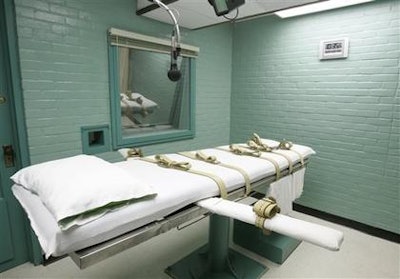
DALLAS (AP) -- Texas prison officials have offered scant evidence to support their claim that pharmacies that supply the state with execution drugs would be in danger of violence if their identities were made public.
If those officials are investigating the threats, including a suggestion a truck bomb could blow up a such a pharmacy, as a serious risk to the safety of the pharmacies or their employees, they refuse to acknowledge doing so.
The Associated Press could find no evidence that any such investigations are underway in Texas, and police in the community where one such pharmacy is located said they are not concerned. In neighboring Oklahoma, the attorney general said Thursday he was investigating such a threat, but several other law enforcement agencies told the AP his office has never mentioned it.
Instead, anti-death penalty advocates believe Texas and other states are trumping up the possibility of violence to avoid having to disclose their name of suppliers, ensuring they can keep buying the drugs they need to put condemned inmates to death.
"If these are the types of threats that the departments are hearing and they're not providing the information to back it up, it's just sort of irresponsible and playing on people's fear," said Jen Moreno, an attorney at the University of California-Berkeley who has represented death row inmates.
"It's using the fear of something tragic and horrible that happened before. It's a sort of fear mongering."
As major drugmakers, many based in Europe, have stopped selling pentobarbital and other substances used in lethal injections to U.S. corrections agencies because they oppose the death penalty, Texas and other states are increasingly forced to rely on compounding pharmacies for the drugs.
Years of protests and public relations campaigns by anti-death penalty advocates have made many of these pharmacies wary of selling execution drugs because of the negative publicity that often follows.
After a suburban Houston compounding pharmacy was identified last fall as the source of Texas' supply of pentobarbital, it demanded the prison system return the drugs and accused officials of placing the business "in the middle of a firestorm."
"I, and my staff ... do not have the time to deal with the constant inquiries from the press, the hate mail and messages, as well as getting dragged into the state's lawsuit with the prisoners, and possible future lawsuits," wrote Dr. Jasper Lovoi, owner of The Woodlands Compounding Pharmacy, in a letter dated Oct. 4.
Spokesmen for the Texas Department of Criminal Justice and the Texas Attorney General's office would not answer questions this week about whether they are investigating any threats to The Woodlands Compounding Pharmacy or any other pharmacy that might sell lethal injection drugs. A spokesman for the Texas Department of Public Safety said he could locate no such investigation taking place.
When police were called in October to deal with a small group of protesters at the pharmacy, no arrests were made. No other incidents have been reported and local detectives are not currently investigating any threats, said Lt. Brady Fitzgerald of the Montgomery County Sheriff's Office.
"There were no problems at the location whatsoever," he said.
The Texas Attorney General's office has consistently rejected the state prison system's requests to deny open-records requests seeking the name of drug suppliers, most recently in 2012, when they found it had "not established disclosure of the responsive information would create a substantial threat of physical harm to any individual."
Earlier this week, prison officials returned with a new request to deny such a request from attorneys who represent an inmate who was executed Thursday evening. "There is a substantial risk that the information will be used in the same manner this time; to threaten, harass, and intimidate the pharmacy into terminating business with the (state)," they wrote.
This time, prison attorneys added a new detail. They said an individual had recently threatened to detonate a truck bomb outside a pharmacy in another state that supplies drugs used in executions.
That appears to be a reference to The Apothecary Shoppe, a compounding pharmacy in Tulsa, Okla. State officials there have said a pharmacy supplying execution drugs received an email in January that raised the specter of the 1995 Oklahoma City bombing that killed more than 160 people.
"As the folks at the federal building can tell you, it only takes one fanatic with a truckload of fertilizer to make a real dent in business as usual," the email reads.
Attorneys for Oklahoma argued that the email was a clear threat. "If an individual decided to offer such helpful advice to the President of the United States, there is no doubt that such an email would be labeled a threat and visit from the proper authorities should be anticipated," they said last week in a brief in which they also admitted they did not treat it that way.
Oklahoma Attorney General Scott Pruitt told the AP Thursday he had launched an investigation, but would not say when it began. Prior to that interview, federal, state and local law enforcement officials in Oklahoma City and Tulsa told the AP no one had informed them about the threat to The Apothecary Shoppe or other pharmacies. All said they are not investigating this or any other threat made against pharmacies that supply execution drugs.
Meanwhile, officials in Delaware and Georgia said they were unaware of any threats made against pharmacies, and the Missouri attorney general, Chris Koster, declined to say if any threats had been identified. All three states have also struggled to identify a drug supplier.
Attorneys for death row inmates say the inmates have a right to know what drugs are being used to execute them, particularly since Texas and other states are using compounding pharmacies, which are not heavily regulated by the U.S. Food and Drug Administration.
"There is simply too much at stake in the secrecy surrounding lethal injection issues for the courts and the public to allow the state to carry out executions without full transparent disclosure," said Madeline Cohen, a Denver-based public defender representing an Oklahoma death row inmate.
McBride reported from Oklahoma City. Also contributing were Associated Press writers Kate Brumback in Atlanta, Randall Chase in Wilmington, Del.; Michael Graczyk in Houston; and Jim Salter in St. Louis.






















